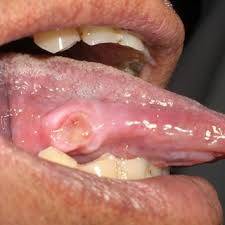Tongue Ulcer
A tongue ulcer is a painful sore or lesion on the tongue's surface, often caused by irritation, infection, or underlying medical conditions.
---
10 Causes of Tongue Ulcers
1. Trauma or Injury
Biting the tongue, sharp edges of teeth, or poorly fitting dentures.
2. Irritation from Foods
Acidic, spicy, or salty foods can irritate the tongue.
3. Stress or Hormonal Changes
Emotional stress and hormonal fluctuations (e.g., menstruation).
4. Nutritional Deficiencies
Lack of vitamin B12, iron, folate, or zinc.
5. Canker Sores (Aphthous Ulcers)
Common, small ulcers with unclear causes.
6. Infections
Viral (e.g., herpes simplex), bacterial, or fungal (e.g., oral thrush) infections.
7. Allergic Reactions
To certain foods, toothpaste ingredients, or medications.
8. Chronic Irritation
Smoking, alcohol use, or chewing tobacco.
9. Underlying Diseases
Conditions like Crohn’s disease, celiac disease, or Behçet’s disease.
10. Medications or Treatments
Chemotherapy, radiation therapy, or certain medications like NSAIDs.
---
10 Signs of Tongue Ulcers
1. Pain or discomfort, especially when eating or drinking.
2. Red or white patches on the tongue.
3. A small round or oval lesion with a red border.
4. Swelling or inflammation around the ulcer.
5. Burning or tingling sensation.
6. Difficulty speaking or swallowing.
7. Bleeding if the ulcer is irritated.
8. Bad breath (halitosis).
9. Dryness of the mouth.
10. Recurrent ulcers in the same or different locations.
---
20 Effects of Tongue Ulcers
Immediate Effects
1. Pain while eating or drinking.
2. Difficulty in chewing.
3. Impaired speech due to discomfort.
4. Loss of appetite.
5. Sensitivity to certain foods (e.g., spicy or acidic).
Oral Health Effects
6. Bad breath due to bacterial buildup.
7. Increased risk of secondary infections.
8. Swelling affecting adjacent tissues.
9. Difficulty maintaining oral hygiene.
10. Altered taste perception.
Systemic Effects
11. Fatigue or irritability due to persistent pain.
12. Malnutrition if eating becomes too painful.
13. Dehydration from reduced fluid intake.
14. Weight loss in severe cases.
15. Emotional distress, anxiety, or embarrassment.
Chronic Effects
16. Recurrent ulcerations in chronic conditions.
17. Scar tissue formation in severe or neglected cases.
18. Difficulty using dental prosthetics due to irritation.
19. Potential progression of underlying conditions (e.g., Crohn’s or celiac disease).
20. Increased risk of complications from untreated systemic conditions.
---
Solutions and Management
Home Remedies
1. Saltwater Rinse:
Mix 1 teaspoon of salt in warm water to reduce swelling and bacteria.
2. Baking Soda Paste:
Apply a paste of baking soda and water to neutralize acids and soothe the ulcer.
3. Honey:
Apply honey to promote healing and reduce pain.
4. Cold Compress:
Use ice cubes to reduce pain and inflammation.
5. Avoid Irritants:
Stay away from spicy, acidic, or salty foods.
Nutritional Support
6. Vitamin and Mineral Supplements:
Focus on B12, iron, folate, and zinc.
7. Increase Hydration:
Drink water to prevent dryness.
Over-the-Counter Products
8. Topical Gels or Ointments:
Benzocaine or lidocaine-based products for pain relief.
9. Antimicrobial Mouthwash:
Prevents secondary infections.
Medical Treatment
10. Corticosteroid Medications:
Prescribed for severe or persistent ulcers.
11. Antiviral, Antibiotic, or Antifungal Medications:
Based on the underlying cause (e.g., herpes, bacterial infection, or thrush).
12. Treatment for Underlying Conditions:
Manage systemic diseases like Crohn’s or celiac disease.
Preventive Measures
13. Oral Hygiene:
Use a soft-bristled toothbrush and avoid abrasive toothpaste.
14. Avoid Allergens:
Identify and eliminate foods or products that trigger ulcers.
15. Quit Smoking and Alcohol:
Reduces chronic irritation.
16. Manage Stress:
Practice relaxation techniques like meditation or yoga.
Professional Monitoring
17. See a dentist or doctor if ulcers persist beyond two weeks, recur frequently, or are accompanied by systemic symptoms like fever or fatigue.
Effective treatment depends on identifying the cause and adopting the appropriate solution. Early intervention prevents complications and promotes faster healing.


